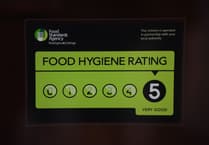A call to convert a former Pembrokeshire village pub, which became commercially unviable, to flats has been submitted to county planners.
Sandra Davis, of O & D Enterprises Ltd, through agent Gerald Blain Associates Limited, seeks a partly-retrospect permission for a change of use of the Drovers Arms, Puncheston to four residential flats.
The application seeks to regularise works undertaken at the beginning of 2024 which were subject to an enforcement notice from Pembrokeshire County council, a supporting statement says.
It adds: “The public house ceased trading in 2022 following the departure of the previous landlord, at which point the premises were returned to the owner/applicant. The public house previously comprised two bar areas, one located within the road-facing elevation and a larger bar situated in a rear extension.
“While the rear bar remains in place, the front bar has been removed to facilitate residential use. The commercial kitchen and toilet facilities are still intact, as are the first floor letting rooms and the landlord’s flat.”
It says the proposed scheme “would remodel the interior of the building to create four residential flats,” the enforcement notice “in relation to the change of use of the ground floor to residential use, replacement of a flat roof with pitched standing seam roof and erection of UPVC cladding,” adding: “This application now seeks to rectify these matters and convert the remainder of the building into flats.”
The statement says that, according to the British Beer and Pub Association (2025), 2,250 pubs have closed across the UK over the past five years, with 289 in 2024 alone largely due to “a significant rise in operational costs, including increased energy bills, business rates, employers’ National Insurance contributions, minimum wage requirements, and the rising costs of food, beverages, and general maintenance”.
“The challenges are particularly acute in rural areas such as Puncheston, where both population density and passing trade are limited. Many rural pubs depend heavily on seasonal summer trade, which makes achieving year-round sustainability even more difficult.
“In the case of the Drovers Inn, the physical size and age of the building result in particularly high maintenance and utility costs, further compounding the financial strain. As a result, the business has become unviable, with successive tenants unable to maintain long-term operations.”
The application will be considered by county planners at a later date.





Comments
This article has no comments yet. Be the first to leave a comment.